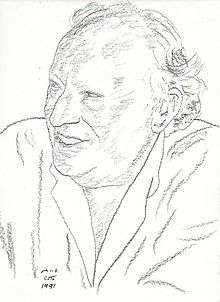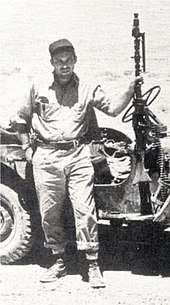Leon Uris
Leon Marcus Uris (August 3, 1924 – June 21, 2003) was an American author of historical fiction who wrote many bestselling books including Exodus (published in 1958) and Trinity (published in 1976).[1]
Leon Uris | |
|---|---|
 Drawing of Leon Uris by Chaim Topol | |
| Born | August 3, 1924 Baltimore, Maryland, U.S. |
| Died | June 21, 2003 (aged 78) Shelter Island, New York, U.S. |
| Resting place | Quantico National Cemetery |
| Occupation | Author |
| Language | English |
| Nationality | American |
| Genre | Historical fiction |
| Notable works | Exodus (1958) Mila 18 (1961) QB VII (1970) |
| Spouse |
Betty Beck ( m. 1945–1968)Marjorie Edwards ( m. 1968–1969)Jill Peabody ( m. 1970–1988) |
Life and career
Uris was born in Baltimore, Maryland, the son of Jewish American parents Wolf William and Anna (née Blumberg) Uris. His father, a Polish-born immigrant, was a paperhanger, then a storekeeper. His mother was first-generation Russian American.[2] William spent a year in Palestine after World War I before entering the United States. He derived his last name from Yerushalmi, meaning "man of Jerusalem". (His brother Aron, Leon's uncle, took the name Yerushalmi.) "He was basically a failure", Uris later said of his father. "I think his personality was formed by the harsh realities of being a Jew in Czarist Russia. I think failure formed his character, made him bitter."[3]

At age six, Uris reportedly wrote an operetta inspired by the death of his dog. He attended schools in Norfolk, Virginia, and Baltimore, but never graduated from high school, and failed English three times. When he was 17 and in his senior year of high school, the Japanese attacked Pearl Harbor and he enlisted in the United States Marine Corps. He served in the South Pacific with the 2nd Battalion, 6th Marines, where he was stationed in New Zealand, and fought as a radioman in combat on Guadalcanal and Tarawa[4] from 1942 through 1944. He was sent to the US after suffering from dengue fever, malaria and a recurrence of asthma that made him miss his battalion's decimation at Saipan that featured in Battle Cry.[5] While recuperating from malaria in San Francisco, he met Betty Beck, a Marine sergeant; they married in 1945.
Coming out of the service, he worked for a newspaper, writing in his spare time. Esquire magazine bought an article in 1950, and he began to devote himself to writing more seriously. Drawing on his experiences in Guadalcanal and Tarawa, he produced the best-selling Battle Cry, a novel depicting the toughness and courage of U.S. Marines in the Pacific. He then went to Warner Brothers in Hollywood helping to write the movie, which was extremely popular with the public, if not the critics.[4] He went on to write The Angry Hills, a novel set in war-time Greece.
His best-known work may be Exodus, which was published in 1958. Most sources indicate that Uris, motivated by an intense interest in Israel, financed his research for the novel by selling the film rights in advance to MGM and by writing newspaper articles about the Sinai campaign.[6][7][8] It is also said that the book involved two years of research, and involved thousands of interviews.[9] According to Jack Shaheen, Americans were largely apathetic about Israel in the 1950s, so the eminent public relations consultant Edward Gottlieb was called on "to create a more sympathetic attitude" toward the newly established state. He therefore sent Leon Uris to Israel to write a novel, which became the bestseller Exodus, introducing filmgoers to the Arab–Israel conflict, and peopled it with heroic Israelis and sleazy, brutal Arabs, some of whom link up with ex-Nazis.[10]
Exodus illustrated the history of Palestine from the late 19th century through the founding of the state of Israel in 1948.[11][12][13] It was a worldwide best-seller, translated into a dozen languages, and was made into a feature film in 1960, starring Paul Newman, directed by Otto Preminger, as well as into a short-lived Broadway musical (12 previews, 19 performances) in 1971.[14] Uris' 1967 novel Topaz was adapted for the screen and directed by Alfred Hitchcock in 1969.[15]
Uris's subsequent works included: Mila 18, about the Warsaw ghetto uprising; Armageddon: A Novel of Berlin, a chronicle which ends with the lifting of the Berlin Blockade in 1949; Trinity, about Irish nationalism and the sequel, Redemption, covering the early 20th century and World War I; QB VII, about the role of a Polish doctor in a German concentration camp; and The Haj, set in the history of the Middle East. He wrote the screenplays for Battle Cry and Gunfight at the O.K. Corral. His work on the subject of Israel has been criticized for being biased against Arabs.[16][17][18]
Personal life
Uris was married three times. His first wife was Betty Beck, whom he married in 1945. They had three children before divorcing in 1968. He then married Marjorie Edwards in 1968, who committed suicide by gunshot the following year.[19][20]
His third and last wife was photographer Jill Peabody, daughter of Frances Gleason and Alfred Peabody of Boston.[21] They had two children, Rachel and Conor. They married in 1970, when she was 22 years old and he was 45.[22][23] He and wife Jill worked together on his book Ireland: A Terrible Beauty, for which she provided illustrations and on Jerusalem: A Song of Songs.[20][24] They divorced in 1988, and soon after Uris settled in New York City.[25]
Death
Leon Uris died of kidney failure at his Long Island home on Shelter Island in 2003, aged 78.[4] His papers can be found at the Harry Ransom Center, University of Texas in Austin, where the University of Texas Press published a literary biography about him.[26] The collection includes all of Uris's novels, with the exception of The Haj and Mitla Pass, as well as manuscripts for the screenplay, Gunfight at the O.K. Corral.[15] He was survived by his five children and two grandchildren.[25]
Selected titles
- Battle Cry, 1953
- The Angry Hills, 1955
- Exodus, 1958
- Exodus Revisited, 1960 (GB title: In the Steps of Exodus)
- Mila 18, 1961
- Armageddon: A Novel of Berlin, 1963
- Topaz, 1967
- The Third Temple (with Strike Zion by William Stevenson), 1967
- QB VII, 1970
- Ireland, A Terrible Beauty, 1975 (with Jill Uris)
- Trinity, 1976
- Jerusalem: A Song of Songs, 1981 (with Jill Uris)
- The Haj, 1984
- Mitla Pass, 1988
- Redemption, 1995
- A God in Ruins, 1999
- O'Hara's Choice, 2003
See also
- List of bestselling novels in the United States
References
- "Author Leon Uris Dies at 78", The Elyria (Ohio) Chronicle Telegram, June 25, 2003, p. A8.
- Congressional Record, p. 16911
- Hillel Italie AP national (June 2003). "Leon Uris, author of 'Exodus', novel of founding of Israel, and other" (news). Deseret News. Retrieved August 11, 2010.
- "Movies". Retrieved February 10, 2018 – via NYTimes.com.
- Nadel, Ira B. Leon Uris: Life of a Best Seller University of Texas Press, 24 Sep. 2010
- Leon Uris, 78, Who Wrote Sweeping Novels Like "Exodus," Dies Archived January 1, 2010, at the Wayback Machine New York Times – June 25, 2003
- Chris Fujiwara (2009). The World and Its Double: The Life and Work of Otto Preminger. Faber & Faber. p. 255. ISBN 978-0-86547-995-1.
- Patricia Erens (March 3, 2009). The Jew in American Cinema. Indiana University Press, 1988. p. 217. ISBN 978-0-86547-995-1.
- Joel Shatzky; Michael Taub (1994). Contemporary Jewish-American Novelists: A Bio-Critical Sourcebook. Greenwood Press. p. 440. ISBN 0-313-29462-3.
- Neff, Donald (June 1998). Fifty years of Israel. American Educational Trust. p. 19. ISBN 9780937165089.
In the early 1950s, an American public relations man, Edward Gottlieb, seeking to improve Israel's image in the United States, hit upon the idea of hiring a writer to go to Israel and write an heroic novel about the new country. The writer was Leon Uris, and his novel, Exodus, became a huge best-seller. Moreover, the highly romanticized novel later became a movie starring Paul Newman. It was a box office smash hit. The fact that Uris's book totally distorted reality and ignored the basic injustice involved in the West imposing on the Middle East a solution to its own problems was completely overlooked.
- Burston, Bradley (November 9, 2012). "The 'Exodus' Effect: The Monumentally Fictional Israel That Remade American Jewry". Retrieved February 10, 2018 – via Haaretz.
- Homberger, Eric (June 25, 2003). "Obituary: Leon Uris". the Guardian. Retrieved February 10, 2018.
- "Exodus, myth and malpractice – Martin Kramer on the Middle East". martinkramer.org. Retrieved February 10, 2018.
- "Ari". Internet Broadway Database. Retrieved December 1, 2018.
- Willmann, Travis. "Leon Uris's Exodus". Fall 2003 Newsletter, Obituary. Harry Ransom Center, University of Texas at Austin. Archived from the original on May 1, 2009. Retrieved January 16, 2010.
- Elsner, Alan (April 24, 2013). "Re-reading Leon Uris' Exodus". Retrieved February 10, 2018.
- Broyard, Anatole (April 27, 1984). "Books of the Times;". Retrieved February 10, 2018 – via NYTimes.com.
- "THE HAJ by Leon Uris – Kirkus Reviews". Retrieved February 10, 2018.
- "Milestones: Feb. 28, 1969". Time magazine. February 28, 1969. Retrieved January 3, 2011.
Marjorie Uris, 26, former New York fashion model who married Author Leon Uris (Exodus, Topaz) six months ago; apparently by her own hand (.38-cal. revolver); in Aspen, Colo.
- Blagden, Nellie (January 12, 1976). "To Jill and Leon Uris, 'Our Marriage Is Like the Melding of Two Generations'". People. Retrieved December 1, 2018.
- "Jill Peabody Married Here To Leon Uris". New York Times. February 16, 1970. p. 41. Retrieved December 1, 2018.
- Bernstein, Adam (June 25, 2003). "Writer Leon Uris Dies". Washington Post. Retrieved December 1, 2018.
- "Leon Uris (1924–2003)". Jewish Virtual Library. Retrieved December 1, 2018.
- Gascoigne, Bamber; Liukkonen, Petri. "Leon (Marcus) Uris )1924–2003)". Authors Calendar: Books and Writers. Retrieved December 1, 2018.
- Harrell, Eben (June 24, 2003). "Author Leon Uris dies". Aspen Times. Retrieved December 1, 2018.
- Nadel, Ira B. (October 2010). Leon Uris: Life of a Best Seller (First ed.). Austin, TX: University of Texas Press. ISBN 978-0-292-70935-5. Retrieved June 12, 2020.
Further reading
- Ira Nadel. Leon Uris: Life of a Best Seller (University of Texas Press; 2010) 376 pages; scholarly biography
External links
- Inventory of Leon Uris novel and screenplay manuscripts and other documents
- Leon Uris at Library of Congress Authorities, with 30 catalog records
- Jill Uris at LC Authorities, with 3 records